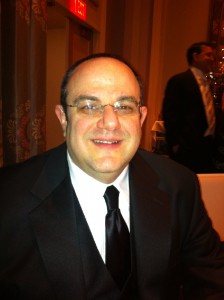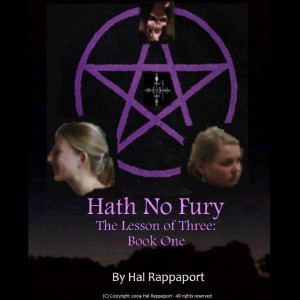Today’s guest shares his knowledge of magick and some cool experiences writing for SyFy Channel and Haunted Attractions Magazine. We welcome Hal Rappaport!
Please tell us a little bit about yourself. Where do you live, etc.? When did you start writing?
I currently live in New Jersey, in a small town just north of Princeton. I grew up in Philadelphia. I guess I’ve been writing stories since I was about 11 or 12. I loved the idea of being able to transport someone to another place, or to create my own.
That is one of the really great things about writing. Speaking of creating a world of your own, you have an interesting premise for your book, Hath No Fury, regarding the lesson of three. How did that premise come about?
The Lesson of Three comes from the Wiccan Rede (pronounced “reed”). It’s part of an understanding that any witch or magick practitioner should understand. Any energy you put out in the universe (magickal or otherwise) will come back to you times three. Similar to Karma, with its balance, the Wiccan and Pagan beliefs are just multiplied by three. It still comes out to be a balance, so it doesn’t strictly conflict with Karma, just that it shows it’s results with “broader strokes.”
You mention Hath No Fury is a fiction story with factually reported events. That sounds intriguing. Can you explain this some more?
Years of research and participation in magick have given me the chance to witness things I would have never thought possible. All the magick and paranormal events in Hath No Fury are based on something I have witnessed myself or by someone I think is an extremely credible witness.
So the Magick (I’ve been using a “k” to distinguish it from magic tricks and illusions done for entertainment) is real. It is not Hollywood-like in nature like so many others.
Anything unusual you had to do for research on this book?
I did a lot of research into Voodoo and their practices. One of the themes in the book is the common threads between the magickal disciplines. They have more in common than not. Like learning a new language, if you know one, you can translate it to another.
I also had to do some research into demonology and even Satanism.
In adapting the practice of magick and incorporating a supreme deity out of mythology, Satanists are essentially creating and living the fiction that was spread by the Catholic Church in order to assimilate and ostracize the pagans (Pagan’s were simply nature worshiping country dwellers, and witches among the pagans were simply regarded as “wise ones.”) in the first place. The practice makes about as much sense as if NASA built a space ship in the shape of the Starship Enterprise and then told everyone that Gene Roddenberry’s stories were all actually real. Like Star Trek, there is a great deal of background and mythology behind their practice.
These groups, whose rites are often similar to that of Wicca, either ignore the rule of three or strangely embrace it as an obeisance to the one they call their dark master. Both use the same fundamentals of what we call magick, in much the same way two opposing armies might use the same weapons or tools. Even one who doesn’t understand the implications of magick can use it. Again, this is just as a child might understand how to operate a firearm but not understand the consequences of actually shooting and killing someone.
When you start digging into the background behind certain beliefs, you find out some really fascinating things. I also did some research into voodoo practices for my second book and learned some interesting concepts around a person’s soul. What themes do you like to explore in your books?
How all religions are more alike than not. Why not celebrate what we all have in common rather than fighting over what’s different.
Absolutely. Any cool places you’ve traveled to, and do you include anything from your travels in your books?
I went to Louisiana for some of it. It gave me a real feel for Voodoo, and the atmosphere.
I used to go to New Orleans when I was in college. I loved visiting the old cemeteries. I see you have written for some interesting magazines and outlets, like NBC, Sy Fy Channel and Haunted Attractions Magazine. Can you tell us a little about those pieces and how they came about?
I’ve always been into technology. I’ve worked in the field for almost 25 years. I wrote for the Syfy Channel’s technology site, DVICE and several of my articles were picked up by NBC (NBC Universal owns the Syfy Channel). I have regular articles that are science fiction inspired, but about REAL technology. It’s been my passion to incorporate something real from fiction. In the case of my book, it’s incorporating something real INTO the fiction.
Before any of the Syfy channel stuff, way back in the early days before Facebook and before Blogs, I created a web site for Horror themes called, Frightscape.com. It’s still in existence in it’s very primitive form.
Anyway, I decided to write an article for my own site about one of the scariest places I had ever been. It was a haunted attraction that had existed in the 1970’s and 80’s. It was called, Brigantine Castle. It was gigantic. It was five stories tall with over 80 live actors. Through the early search facilities of the web, I found a few of the original cast and got them together using a yahoo group (They still use it). It gave me a unique opportunity to interview them and to write some great stuff about the place, with a lot of their pictures and even some sound recordings.
The editor of Haunted Attractions magazine read my web site and asked me to write one for him. It was my first professional writing. I’ve written a few more articles for Haunted Attractions Magazine since then, along with a few other industry publications.
I think I would have avoided the Brigantine Castle. I’m a big wuss when it comes to haunted attractions. Cool that you brought together some of the original cast. You’ve obviously had lots of great experiences. What has been one of your biggest challenges so far in your writing career?
Getting the time to write is the biggest challenge. If it wasn’t for my wife’s suggestion that I get out of the house to write somewhere undistracted, I could have never finished it.
I can completely relate to that. Speaking of your wife, does she read your stuff?
My wife is my biggest fan and my toughest critic. Once I got past getting defensive about her criticism and realized she was actually helping me, it went a long way to making me a better writer.
What books/authors have inspired your writing?
Dean Koontz, Stephen King, Robert Heinlein.
Yep. Me too, the two Ks. Koontz and King. What book(s) are you reading right now?
I am in the middle of Stephanie Myer’s “The Host.” It’s a little slower than her other work but she has a gift for storytelling that I think get’s lost by the rush of young girls who are attracted to her work.
Do you listen to music while writing? If so, what?
Rush, Queensryche, AC/DC and the Grateful Dead mostly. It depends what I’m writing.
Me too. This has been a very interesting and fun interview. Thanks so much for stopping by and sharing some of your insights and inspiration behind your stories.
The sequel to Hath No Fury, “Moments of Rhythm and Magic” will be out Summer 2013. We can’t wait.
Here’s a snippet from Hal’s release, Hath No Fury: 
She tacked up the Violet and gold tapestry which she had hand embroidered with the symbol of the triple Goddess. She managed to stay in touch with Anna whose spiritual guidance kept her focused. Anna encouraged her to ask questions. She explained that Wicca wasn’t exactly a “faith,” in the way it never asked a practitioner to accept anything blindly. There was a “respect” but no sacrilege in any idea or question. Amy felt the way Wicca referred to the divine having both male and female aspects was a balance that just seemed to make sense to her. She felt most religions shared more in common than they were all willing to admit. In fact most were more similar than different. It was this realization that opened her mind to new ideas and it made her wonder why the differences closed so many others’ minds. Like the Vulcans in Star Trek who celebrated the diversity, she felt that to be truly spiritual, learning and respecting the differences rather than hating because of them.
Book and Author Links:
Amazon (paperback, Kindle and Audio)
Barnes and Noble (Nook & Paperback)
